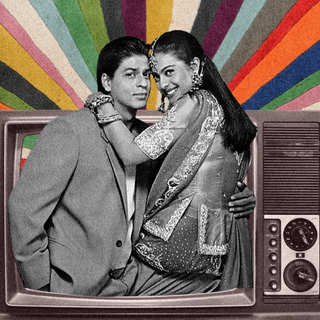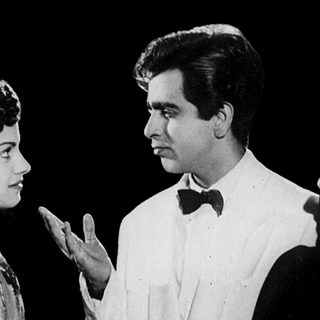
Toxic Fan Culture Around Sexual Assault Cases Forces Us to Rethink Our Relationship With Celebrities
Marilyn Manson fans are discrediting Evan Rachel Wood online — a playbook that begs deeper questions about how celebrity fandoms dictate social justice.

No sooner did the internet erupt in celebratory fanfare over Johnny Depp’s supposed vindication, than a different celebrity became the focus of another concerted rescue campaign. Marilyn Manson, an alternative rock personality, was accused of multiple charges of sexual assault by several people — including Westworld star Evan Rachel Wood. Manson then filed a libel lawsuit against Wood that is pending in court, but not many are optimistic about how it will play out despite damning evidence against Manson in the public record.
In the last few days, Twitter began seeing a familiar hashtag trending with a different name: #IStandWithMarilynManson. Some social media users have clubbed Manson into the Johnny Depp category: of supposed victims of a particular archetype of femme fatale, one whose modus operandi is that of played-up victimhood to enact their twisted revenge fantasy. Worse is how Evan Rachel Wood is now being doubted along the same lines as Amber Heard — with many claiming they’ve always believed Depp and Manson to be innocent and Heard and Wood to be scheming, manipulative liars.
The Johnny Depp case may be the beginning of the end for #MeToo — in that it heralded a post-feminist, post-truth narrative about the possibility of women as perpetrators unleashing terrible injustice over hapless men. But it is at this point that we must stop to examine the role of fan cultures in #MeToo itself.
Related on The Swaddle:
Why We Feel Close to Celebrities We Have Never Met
In its most flammable phase, the movement involved big names. Indeed, the whole point of the movement was to expose how men with fame, power, money, and most importantly, influence, used a potent combination of systemic advantages to cover up their misdeeds on a systemic level. When we think #MeToo, we think of celebrities — high–profile men who have been “brought down.” Many have noted how the response to the Johnny Depp trial is a post-#MeToo backlash — almost serving as revenge for all the ways in which widely admired men have been wronged by not just women who accuse them, but by the larger culture itself.
The clarion call to “believe women” arguably began in recognition of the fact that power imbalances between the famous men accused of sexual assault and the survivors who accused them — more often than not, women adjacent to fame but never quite in its spotlight — mean that our culture more readily takes the side of the more powerful. In the case of men who are famous — they’ve built a relationship with their fans over years of storytelling and art that, in many cases, shaped an image of masculinity that fans emulated and admired. In the process, a parasocial relationship is established wherein accusing a charismatic figure like Johnny Depp is like accusing a role model around whose image many have built up their own personalities and fantasies.
The result is that the discrediting of accusers is not just limited to attempts at discrediting their “evidence” (an already slippery slope, considering that evidence is hard to obtain in cases of sexual assault and intimate partner violence) — it becomes viciously, vindictively, personal. Many of the memes about Amber Heard were focused not on discrediting what she had to say, but on her entire personhood itself — calling her names and giving her monickers whose entire purpose was to insult and demean. When legions of people do it on behalf of a man who doesn’t know any of them personally, it is time to step back and question why so many felt that they had a personal stake in it.
Related on The Swaddle:
How Celeb Fan Culture Minimizes Accountability
It has to do with how entertainment culture deliberately fosters parasocial relationships that make people feel like they know someone even when they don’t. From late-night talk shows, promotions, red carpet interviews, and highly publicized philanthropy campaigns (think Johnny Depp’s visit to a children’s hospital as Jack Sparrow), artists’ public facades are often engineered in a way as to feel personal. It doesn’t matter if they really are as kind, jovial, and funny as they seem — the complicated landscape of PR ensures that every single move, gesture, and word uttered by celebrities is spun to build a brand out of them. The thing about brands, moreover, is that they exist to sell. Replace Johnny Depp with any charismatic, disruptive male celebrity figure and you get a brand that has successfully been bought by legions of fans. This creates a culture of one-sided love and fealty towards what these figures represent rather than who they are.
It is true, to an extent, that celebrities are inextricable from “The Culture” — that amorphous, slippery thing that is hard to define and yet is felt by everyone in a moment of change. But they do also tend to become the locus of cultural changes such as the ones #MeToo tried to enact — in the process, fan cultures intervene in the lives of many systematically marginalized people and prevent their access to any form of justice, closure, or even participation in how a cultural moment plays out. Nothing spells this out more clearly than how the Johnny Depp trial has already begun turning survivors of domestic violence away from courts. “This case is my worst fear playing out on a public stage… [It] tells me that [my ex] was right. If he chose to, he could destroy and humiliate me beyond repair,” one survivor told Rolling Stone.
It is no coincidence, therefore, that many have called for greater media literacy and awareness in the wake of the Depp-Heard trial to try to tackle a culture where individuals develop deeply personal investments in celebrities. But in the case of people who give us art, this is arguably much more difficult. It’s why Woody Allen — a much-loved, much–emulated auteur filmmaker — continues to receive much support from fans despite serious allegations of sexual abuse against his step-daughter, Dylan Farrow. And it’s also why many survivor advocates don’t hold out much hope for the Marilyn Manson case to turn out differently.
In being the representational images of cultural shifts, fans’ relationships with celebrities ensure that the shifts become about the celebrities themselves. In the process, the opportunities to shift anything real are lost, and the communities depending on them falling through the cracks.
Rohitha Naraharisetty is a Senior Associate Editor at The Swaddle. She writes about the intersection of gender, caste, social movements, and pop culture. She can be found on Instagram at @rohitha_97 or on Twitter at @romimacaronii.
Related


Can We Move On: From the Trope of Friends Who End Up Together Because Men and Women Can Never Be ‘Just Friends’
